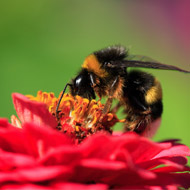Neonicotinoid replacement may also harm bees - study

Neonicotinoids are one of the most widely-used insecticides. But growing evidence shows they are harmful to bees and other pollinators.
A neonicotinoid pesticide replacement may have similar harmful effects on bees, according to research by the University of London.
The study, published in the journal Nature, found that sulfoximine-based insecticides have ‘severe sub-lethal effects on bumblebee colonies’. It notes that bees exposed to the sulfoxaflor during the growth phase 'produced significantly fewer workers, and consequently fewer offspring'.
‘Our results caution against the use of sulfoximines as a direct replacement for neonicotinoids,’ the researchers conclude. ‘To avoid continuing cycles of novel pesticide release and removal, with concomitant impacts on the environment, a broad evidence base needs to be assessed prior to the development of policy and regulation.’
Sulfoximine-based insecticides have a different chemical structure to neonicotinoids and have been viewed as a possible replacement. Approved for use in China, Canada and Australia, they kill pests by disrupting their nervous system.
Researchers are now urging regulators to look at the non-lethal effects of sulfoximines on bees before issuing a licence for new products. Speaking to BBC News, Dr Ellouise Leadbeater of Royal Holloway, University of London, said:
"Our study highlights that stressors that do not directly kill bees can still have damaging effects further down the line because the health of the colony depends on the health of its workforce."
Neonicotinoids are one of the most widely-used insecticides. But growing evidence shows they are harmful to bees and other pollinators.
In the EU, all outdoor use of three neonicotinoids (clothianidin, imidacloprid and thiamethoxam) is prohibited and only allowed in permanent greenhouses where no contact with bees is expected.



 The Veterinary Medicines Directorate (VMD) is inviting applications from veterinary students to attend a one-week extramural studies (EMS) placement in July 2026.
The Veterinary Medicines Directorate (VMD) is inviting applications from veterinary students to attend a one-week extramural studies (EMS) placement in July 2026.